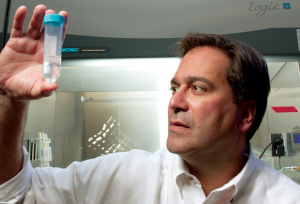Awards and Honors
Chemist and nanoscientist Chad Mirkin receives 2020 AAAS Philip Hauge Abelson Prize
January 23, 2020

Chad Mirkin, director of the International Institute for Nanotechnology at Northwestern University, is the winner of the 2020 Philip Hauge Abelson Prize, which is presented by the American Association for the Advancement of Science to a scientist or public servant who has contributed significantly to the advancement of science in the United States.
“Uniquely, Chad is both, and his contributions have spanned research, innovation, entrepreneurship, education, public understanding, and national service and public policy,” said Peter Stang, a professor of chemistry at the University of Utah, in his nomination letter.
A professor of chemistry, chemical and biological engineering, biomedical engineering, materials science and engineering, and medicine, Mirkin is being honored for multiple contributions to the fields of chemistry and nanoscience.
One of the most cited chemists in the world, Mirkin discovered and developed spherical nucleic acids (SNAs), structures made by chemically arranging densely packed, highly oriented strands of DNA around a nanoparticle core. SNAs exhibit chemical and physical properties distinct from their linear counterparts. For instance, they actively are transported into living cells and can catalyze chemical transformations that conventional nucleic acids cannot, properties that have led to the development of diagnostic tools and pharmaceuticals.
Mirkin also has invented and developed a series of scanning probe-based tools and techniques that allow researchers to pattern nanostructures for a number of purposes. Among these printing techniques is dip-pen nanolithography (DPN), named by National Geographic as one of 100 scientific discoveries that changed the world. DPN transforms scanning probe tools from imaging techniques to chemical synthesis tools and allows researchers to fabricate miniaturized chemical and biological structures using atomic force microscope tips that transfer molecular “inks” to surfaces. Mirkin’s polymer pen lithography technique builds on DPN and employs millions of polymer tips to transfer molecules over a larger surface area in a high-throughput fashion.
He has over 1,200 patent applications (more than 350 issued) and has founded eight biotechnology and nanofabrication companies that have commercialized more than 2,000 products, including the Verigene system, a low-cost medical diagnostic tool able to quickly test for a number of different bacteria and viruses. It is in wide use in hospitals around the world.
“The breadth of impact of Dr. Mirkin’s chemical discoveries are virtually unrivaled, and they have had a positive impact on society and humanity and enabled us to better understand the world around us,” said Stang.
The award also recognizes Mirkin’s service to the scientific community; he is an associate editor of Journal of the American Chemical Society and editorial board member of the Proceedings of the National Academy of Sciences. He also has brought scientific advice to the policy realm, serving for eight years on President Barack Obama’s President’s Council on Advisors on Science and Technology.
Mirkin’s commitment to mentoring and training the next generation of scientists has enriched the diversity of the field of chemistry – over a third of his mentees have been members of groups underrepresented in science, Stang noted. Mirkin has trained and taught more than 270 graduate students and postdoctoral associates and thousands of undergraduate students.
As founder and director of the International Institute for Nanotechnology at Northwestern University, he has helped develop education tools to introduce nanoscience to the public more broadly, including a nanoscience exhibit at the Museum of Science and Industry in Chicago, a learning module for high school students and an undergraduate journal on nanoscience and nanotechnology, Nanoscape.
He holds the rare distinction of being elected a fellow to all three branches of the U.S. National Academies: Sciences, Engineering and Medicine. He is the recipient of the Lemelson-MIT Prize, the Kabiller Prize in Nanomedicine, the American Institute of Chemists Gold Medal, the Dan David Prize, and the National Academy of Sciences Sackler Prize in Convergence Research, among many other awards and honors.
Since 1985, the annual Philip Hauge Abelson Prize has recognized individuals who have contributed significantly to the advancement of science in the United States. The award was named in honor of Abelson, who, in the course of a 60-year career in the sciences, served as editor of Science and a longtime adviser to AAAS.
The award recipient may be either a public servant who has made exceptional contributions to scientific advancement or a scientist whose career has been distinguished by both scientific achievement and service to the scientific community. Mirkin will receive the award on Feb. 13 during the opening presidential address at the AAAS Annual Meeting in Seattle.
The International Institute for Nanotechnology at Northwestern University is an umbrella organization that represents and unites more than $1 billion in nanotechnology research, education and supporting infrastructure.